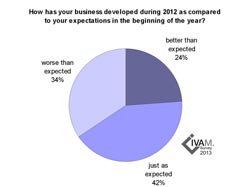Unsettled economic situation leaves mark on microtechnology industry

In the European microtechnology industry, the business situation in 2012 has been worse than expected in a third of companies. IVAM Research<br>
At present, the mood of the industry is quite subdued, as the economic data survey of the IVAM Microtechnology Network confirms. In 2012, the business situation has been worse than expected in a third of companies. While orders and staff numbers have slightly risen and production has remained stable for a large proportion of companies, sales figures have dropped.
The lack of funding for the strategic business development, expansion or investment in innovation is still an essential problem. Only 7 % of companies had more funds available for corporate financing in 2012 than in the year before, only 16 % have been able to invest more than in 2011.
Foreign trade has developed modestly in the last business year, thus continuing the trend of previous years. Throughout Europe, the export rates of the microtechnology, nanotechnology and advanced materials industry have remained rather stable in 2012.
In order to be able to compete the companies will attempt to enter the markets also via subsidiaries or cooperation. Markets of particular interest are the BRIC countries as well as countries that have recently been reclassified from emerging markets to industrial nations. Brazil, Russia, India and China as well as Israel, Taiwan and South Korea are countries which the companies want to enter in the short and medium term, e.g. by cooperative ventures or setting up branches.
Media Contact
More Information:
http://ivam.de/survey_2013?lang=enAll latest news from the category: Business and Finance
This area provides up-to-date and interesting developments from the world of business, economics and finance.
A wealth of information is available on topics ranging from stock markets, consumer climate, labor market policies, bond markets, foreign trade and interest rate trends to stock exchange news and economic forecasts.
Newest articles

First-of-its-kind study uses remote sensing to monitor plastic debris in rivers and lakes
Remote sensing creates a cost-effective solution to monitoring plastic pollution. A first-of-its-kind study from researchers at the University of Minnesota Twin Cities shows how remote sensing can help monitor and…

Laser-based artificial neuron mimics nerve cell functions at lightning speed
With a processing speed a billion times faster than nature, chip-based laser neuron could help advance AI tasks such as pattern recognition and sequence prediction. Researchers have developed a laser-based…

Optimising the processing of plastic waste
Just one look in the yellow bin reveals a colourful jumble of different types of plastic. However, the purer and more uniform plastic waste is, the easier it is to…



